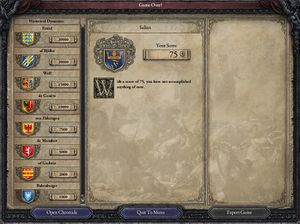![]() 分数(英文:Score)是一个衡量你的家族伟大程度的标准,通过累加你扮演的历代角色去世时的威望和虔诚获得。当开启铁人模式时,如果玩家成功达到极高的分数,可以解锁某些Steam成就。
分数(英文:Score)是一个衡量你的家族伟大程度的标准,通过累加你扮演的历代角色去世时的威望和虔诚获得。当开启铁人模式时,如果玩家成功达到极高的分数,可以解锁某些Steam成就。
在游戏结束界面中,会显示游戏所在时期内历史上的成功家族的假想分数:
| 分数 | 家族 | 有趣角色 | 描述 |
|---|---|---|---|
| 100 000 | 卡佩家族 | 腓力一世 卡佩 | 卡佩家族由秃头查理的重臣强者罗贝尔所创建。他的后代在1066年获得法兰西王位。尽管在1322年时主支绝嗣,卡佩家族的旁系分支依然在1337年时拥有法兰西,葡萄牙,那不勒斯,匈牙利和纳瓦拉的王位。其他分支还拥有布列塔尼,勃艮第,波旁,普罗旺斯和亚该亚公爵头衔。一个更远的分支是君士坦丁堡拉丁帝国的皇帝。这真是中世纪欧洲史最伟大的家族。 |
| 90 000 | 哈布斯堡家族 | 维尔纳 冯 哈布斯堡 | 一开始,在 1066 年,哈布斯堡家族前景十分暗淡。比起十一世纪日耳曼诸多呼风唤雨的庞大家族,哈布斯堡只是一个瑞士的小伯爵,在帝国内部无足轻重。但是一连串精心策划的政治联姻使家族领地不断扩大,最终在十三世纪末十四世纪初的大混乱中被选为神圣罗马帝国皇帝,获得了帝国的统治权。尽管皇位并不长久,哈布斯堡还是借机攫取了奥地利公爵头衔。依靠奥地利,哈布斯堡家族在中欧的统治持续到了 1918 年。 |
| 80 000 | 留里克家族 | 九世纪时,来自瑞典的维京人留里克在罗斯(今天的俄罗斯和乌克兰)建立了一个国家。在继承人中分割领地的政策导致了国家的分裂和不同支系之间的争斗不休。这使他们在十三世纪时过于分裂,无法抵挡住蒙古入侵。成吉思汗之孙拔都逐个征服了这些公国,强迫他们向蒙古人纳贡。不过留里克家族还是保存下来了,等待着重新崛起的时机…… | |
| 70 000 | 伊夫雷亚家族 | 伊夫雷亚家族有着杰出的祖先,但在1066年,尽管他们取得了从意大利国王到勃艮第伯爵的头衔,却仍然在走下坡路。看起来这个家族已经过气了,不过一次幸运的联姻后卡斯蒂利亚和莱昂将王冠拱手送上,使伊夫雷亚家族重新成为欧洲舞台上的关键角色之一。 | |
| 60 000 | 皮亚斯特家族 | 博莱斯瓦夫 “英勇者”皮雅斯特 | 皮亚斯特家族的创建者在成为波兰国王之前据说是个轮匠。尽管波兰王国四分五裂,皮亚斯特家族还是在这一时期稳居王位,并逐渐将波兰变得统一而强盛。家族的其他成员包括神圣罗马帝国的西里西亚公爵。在1337年,有史以来最伟大的国王卡齐米日三世统治着波兰,正在秣马厉兵准备反击蒙古汗国。 |
| 50 000 | 科穆宁家族 | 阿莱克修斯 科穆宁 | 如果我们将1057年通过政变成为皇帝的伊萨克一世排除在外,科穆宁家族一直是拜占庭帝国的忠诚仆人。在曼奇刻尔特惨败于塞尔柱人之后的大混乱中,科穆宁家族坚守其引以为傲的家族传统,发动了另一场政变。在接下来的100年里,科穆宁家族遏制住了拜占庭帝国的衰落,为帝国带来了所谓的科穆宁复兴。讽刺的是,科穆宁家族同样被宫廷政变所推翻,不过他们在小亚细亚的特拉比松建立了新的帝国。 |
| 40 000 | House Plantagenet | House Plantagenet, who started off as a cadet branch of the elder house of Anjou. Geoffrey, the founder of the dynasty, was left with the family lands in France when his father went off to Jerusalem to become King. The Plantagenet family had a power base in France, and through marriages inherited the Kingdom of England and large parts of France. The French inheritance would lead to an ongoing conflict with France and the Hundred Years War. | |
| 30 000 | House Estrid | Svend II Estrid | House Estrid. Coming to the throne of Denmark in 1047, the house of Estrid was one of only two royal families to still hold kingdoms in 1337. Although there were several attempts at expansion, Denmark only gained small amounts of land in Estonia, as most would be gained and then lost. The dynasty itself managed to survive and prosper in an era of chaos and turmoil, which is no mean feat. |
| 20 000 | House af Bjälbo | Birger af Bjälbo | House af Bjälbo, who arguably created the modern state of Sweden. Prior to their accession the Swedish state was highly decentralised, where the writ of royal authority barely ran. The Bjälbo Kings regulated things more clearly, conquered Finland and by 1337 had entered a personal union with Norway, leading Sweden to the height of its medieval power. |
| 15 000 | House Welf | Welf I Welf | House Welf, a dynasty very much down on its luck in 1066. By 1100 that had all changed. Control of two of the most powerful duchies in Germany and substantial lands in Italy made them the second most powerful family in Germany after the Hohenstaufen. One member of the Welf family would eventually gain the title of Emperor, but in the struggles would also weaken the family and much of the lands would be lost. The family would consolidate its holdings in Northern Germany as Dukes of Brunswick and remain a player in Imperial politics. |
| 10 000 | House de Genève | Geraud de Geneve | House de Genève, who were counts of Geneva in 1066. The house held this territory throughout the period and were still counts of Geneva in 1337. They never managed to climb any higher, but at the same time were able to cling onto their holdings. |
| 7 500 | House von Zähringen | House von Zähringen, who were powerful landholders in Southern Germany and holders of the Duchies of Verona and Carinthia, which made the Zähringen family a key power holder in Germany. A failed rebellion against the Emperor saw these titles stripped from the family and other parts of the family lands would be inherited by other dynasties, leaving the family lands shrunk to a few holdings in Swabia. | |
| 5 000 | House de Montfort | Simon de Montfort | House de Montfort, who were small scale land holders in France. Through marriage and service the family gained estates in both Normandy and England. It was under the zealous but cruel Simon de Montfort the Elder that the family ascended. Through his participation in the Albigensian Crusade the family would add substantial estates in the South of France. The family reached the height of its power through his son Simon de Montfort the Younger, who became de facto ruler of England. However, all this would prove fleeting and by 1337 the family would have lost it all and gone extinct in the male line. |
| 2 000 | House of Godwin | Harold Godwinson | House of Godwin. On January 5th, 1066, Harold godwinson became King of England. His father had spent much of the reign of King Canute building up the family power base and with the death of Edward the Confessor he was able to assume the throne. However, he wasn't the only claimant... Harald of Norway and William of Normandy both also claimed the title and invaded. Harald was defeated and killed at the battle of Stamford Bridge, but Harold would later be defeated and killed (along with two of his brothers) by William at the battle of Hastings. With his death, the power of the House of Godwin collapsed and its lands were divided amongst the victorious Norman Lords who followed William. |
| 1 000 | House Babenberger | House Babenberger, which is not to be confused with the slightly more famous von Babenbergs of Austria. This cadet branch of house Capet held minor titles in Franconia. History probably wouldn't remember them if it wasn't for the more famous family with a similar name. |
